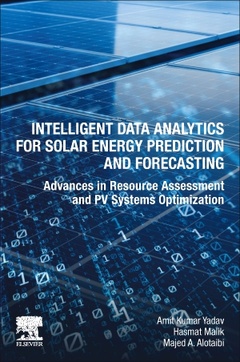Intelligent Data Analytics for Solar Energy Prediction and Forecasting Advances in Resource Assessment and PV Systems Optimization
Auteurs : Yadav Amit Kumar, Malik Hasmat, Alotaibi Majed A.

Intelligent Data Analytics for Solar Energy Prediction and Forecasting: Advances in Resource Assessment and PV Systems Optimization explores the utilization of advanced neural networks, machine learning and data analytics techniques for solar radiation prediction, solar energy forecasting, installation and maximum power generation. The book addresses relevant input variable selection, solar resource assessment, tilt angle calculation, and electrical characteristics of PV modules, including detailed methods, coding, modeling and experimental analysis of PV power generation under outdoor conditions. It will be of interest to researchers, scientists and advanced students across solar energy, renewables, electrical engineering, AI, machine learning, computer science, information technology and engineers.
In addition, R&D professionals and other industry personnel with an interest in applications of AI, machine learning, and data analytics within solar energy and energy systems will find this book to be a welcomed resource.
PART A: Solar Energy Prediction and Forecasting Resources 1. Intelligent Data Analytics Tools and Techniques 2. Solar Energy Prediction and Forecasting Resource Assessment PART B: Market Research and Survey of Intelligent Data Analytics for Solar Energy Prediction and Forecasting 3. Intelligent Data Analytics in Solar Irradiance Prediction 4. Intelligent Data Analytics for Tilt Angle Optimization of PV Systems 5. Intelligent Data Analytics for Electrical Characteristics of Solar PV Modules PART C: Intelligent Data Analytics Methods for Solar Energy Prediction and Forecasting 6. Intelligent Data Analytics for Feature Extraction and Selection in Solar Radiation Prediction and Forecasting 7. Intelligent Data Analytics for Tilt Angle Optimization for Installation of Solar PV Systems for Maximum Power Generation 8. Intelligent Data Analytics to Analyze the Effect of Tilt Angle on Optimum Sizing and Power Generation of Standalone PV Systems 9. ntelligent Data Analytics to Analyze the Optimum Tilt Angle Influences on Grid Connected PV Systems 10. Intelligent Data Analytics for Maximum Power Prediction of Photovoltaic Modules in Outdoor Conditions 11. Intelligent Data Analytics for Daily Array Yield Prediction of Grid-Interactive Solar PV (GISPV) Plants
Dr. Hasmat Malik received his Diploma in Electrical Engineering from Aryabhatt Govt. Polytechnic Delhi, B.Tech. degree in electrical & electronics engineering from the GGSIP University, Delhi, M.Tech degree in electrical engineering from National Institute of Technology (NIT) Hamirpur, Himachal Pradesh, and Ph.D in power systems from the Electrical Engineering Department, Indian Institute of Technology (IIT) Delhi, India. He is currently a Postdoctoral Scholar at BEARS, University Town, NUS Campus, Singapore, and an Assistant Professor (on-Leave) at the Division of Instrumentation and Control Engineering, Netaji Subhas University of Technology Delhi, India. A member of various societies, Dr. M
- Presents novel intelligent techniques with step-by-step coverage for improved optimum tilt angle calculation for the installation of photovoltaic systems
- Provides coding and modeling for data-driven techniques in prediction and forecasting
- Covers intelligent data-driven techniques for solar energy forecasting and prediction
Date de parution : 11-2024
Ouvrage de 350 p.
15.2x22.8 cm
Thèmes d’Intelligent Data Analytics for Solar Energy Prediction... :
Mots-clés :
solar; energy; photovoltaic; modelling; AI; ML; tilt; yield; forecasting; prediction; data; intelligence



